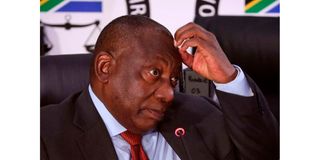Ramaphosa says hands ‘tied’ on Eswatini despite key SADC role

South African President Cyril Ramaphosa.
South Africa’s President Cyril Ramaphosa says his hands are tied from intervening in the violent pro-democracy protests now rocking Eswatini, his office has said on Tuesday.
This position was taken as the United Nations called for the Eswatini army and police to exercise restraint on the protesters amid reports of deaths and injuries.
President Ramaphosa is the current chair of the Southern African Development Community (SADC), an organ for politics, defence and security, placing him in the spotlight to act on Eswatini.
But South Africa’s minister in the presidency, Mondli Gungubele, said SADC is yet to receive a report of the previous unrest that hit Africa’s last absolute monarchy in June and July.
That, Gungubele said, is blocking President Ramaphosa from intervening in Eswatini but would only get involved if other SADC members give them the green light to do so.
“In South Africa, the belief we have is that if possible, the problems of a different country should be resolved within the instruments that exist within that country,” Gungubele told Newzroom Afrika on Tuesday.
“The extent to which South Africa gets involved [in Eswatini] depends on a number of breaches which I think also depends on how Mrs Pandor [minister of international relations and cooperation] and all other heads of state who are involved brief us if there is a need for South Africa to be involved.”
He added: “That advice will only emanate from that [SADC] report. I cannot make a call on the state of the situation right now. Although at face value, what is happening in Eswatini doesn’t look good.”
South Africa is Eswatini’s biggest trading partner and most of the former’s big companies operating in the tiny kingdom remained closed on Tuesday due to the business shutdown in major cities.
In early July, Naledi Pandor was part of a SADC delegation to Eswatini that met the acting prime minister at the time, Themba Masuku, regarding the pro-democracy protests.
The delegation urged King Mswati to engage in dialogue with pro-democracy groups but the king is widely reported to have refused.
While calls are growing for South Africa to act on Eswatini, Mrs Pandor was in Abidjan attending a Joint Commission for Cooperation between South Africa and Ivory Coast.
The Swaziland Solidarity Network has pleaded with SADC to step in as Eswatini is “reaching a boiling point”.
Meanwhile, UN Secretary-General Antonio Guterres has added his voice to the rioting in Eswatini.
The UN’s plea comes following the gunning down of a man by the police last week, as well as several reports of unarmed protesters being shot and injured by security forces.
Schoolchildren have also joined the protests, leading to a nationwide closure of schools after the army was initially deployed to quell the rioting by learners.
Guterres urged “the government to ensure that security forces act in conformity with relevant international human rights standards including the United Nations Convention on the Rights of the Child”.
He also expressed “concern” on the “recent deployment of armed security forces at various schools, reports of excessive use of force to student demonstrations and the indefinite closure of schools".
The Economic Freedom Fighters of Swaziland expressed “shock at the high level of police and army brutality” in Eswatini.





